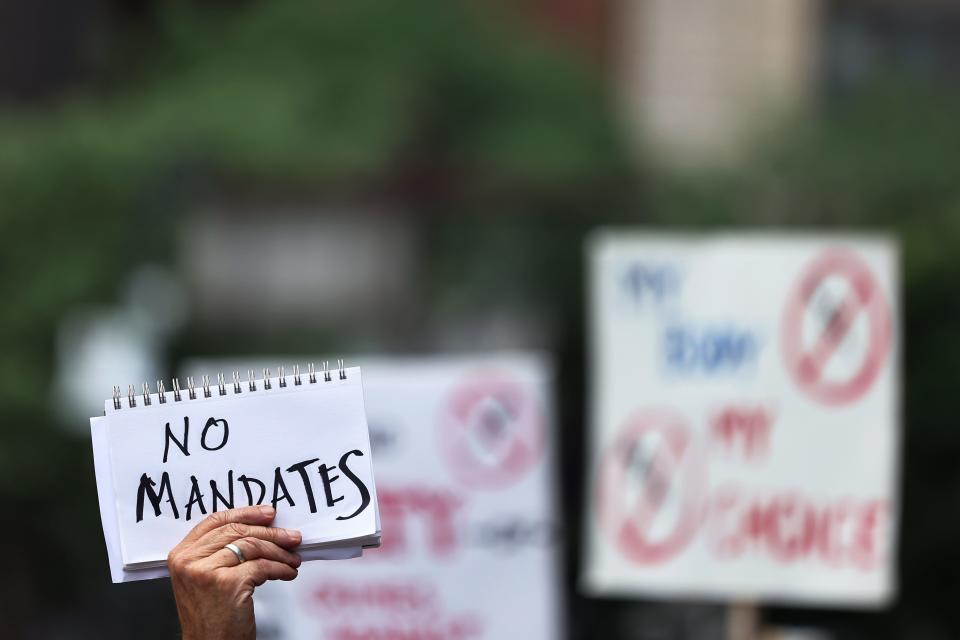Joe Biden's plan to combat COVID-19 is more than a vaccine mandate. It's a testing mandate, too.
A week ago, President Joe Biden signed a measure requiring employees of businesses with 100 or more workers be either vaccinated against COVID-19 or undergo weekly testing if they aren't working from home.
It's been called a vaccine mandate, but experts say it can just as easily be thought of as a testing mandate. Both will help the ultimate goal of fighting the pandemic, but there are trade-offs. Vaccination, while contentious for some, is easy and free for consumers, and a better weapon overall. Testing helps slow the spread, but it can be complicated and it's not yet known yet how costs will be covered.
"You can say it's a testing mandate you get out of by being vaccinated, or a vaccination mandate you can get out of by being tested," said Daniel Salmon, director of the Institute for Vaccine Safety at Johns Hopkins Bloomberg School of Public Health.
But "you're not going to test your way out of the pandemic," he said. "We need high levels of population immunity that are going to come from vaccination, which provides better protection than from natural infections."
Stay connected: Subscribe to Coronavirus Watch, your daily update on all things COVID-19 in the USA
The new Labor Department standard would apply to more than 80 million Americans working in the private sector. About 75% of the U.S. population 18 and over has had at least one dose of vaccine, leaving 20 million workers potentially facing the choice of testing or vaccination.
For those who don't want to get vaccines, "testing is a pretty easy way out," said Salmon, who studies mandatory immunization programs.

That's how some of her clients are seeing it, said Stephanie Gaston, a labor and employment attorney and partner with the law firm of Bradley Arant Boult & Cummings in Houston.
"The employer might decide, ‘I don’t want my employees to have to get the vaccine so instead I’m going to allow them to produce a weekly negative test,'" she said.
Who will pay for those tests remain a huge and open question. The Occupational Safety and Health Administration has not yet released the emergency temporary standard that will clarify whether employers or employees are responsible for the cost of testing and whether it might be reimbursed by either the government or through a tax credit.
"I think we'll see pushback if they have to pay," Gaston said of employers.
For some companies in areas where vaccination rates are low, it could be extremely expensive to pay for weekly testing for all the employees don't want to get vaccinated, said Brooke Iley, co-chair of the labor and employment group at the law firm of Blank Rome in Washington, D.C.
"It's not in their budget; they would be hit very hard if they had to cover these tests," she said.
The OSHA standard could be a way for employers to shift to mandates because they don't want to foot the testing bill, said Dr. William Schaffner, a professor and infectious disease expert at the Vanderbilt University School of Medicine in Nashville, Tennessee.
"Some employers may say, 'I’m not going to pay for (your test.) The vaccine is free, why should you burden me with your choice?" he said.
The mandate may not stick. The OSHA rule requirement is almost certainly headed to court, said Dorit Reiss, a law professor at the University of California, Hastings College of the Law, and an expert on vaccine requirements.
"There's a history of OSHA using its power to regulate the workplace," she said. "But we haven't seen the standard yet. It really depends on how OSHA tailors it. The devil is going to be in the details."
The Biden administration's other vaccine mandates are on firmer ground, she said.
They cover most federal government workers, all 17 million workers at nursing home facilities and hospitals that receive federal funds and staff of federal early childhood programs.
"In the case of federal workers and contractors, the government is their employer so it has the right to impose workplace health and safety standards," she said.
There's a long history of the government requiring hospitals and health care facilities that receive federal funding to comply with its conditions.
"For example, they require measures to prevent hospital-acquired infections," she said.
Experts agree the vaccines are the best way to stop the COVID-19 pandemic. Even with the delta variant, the vaccinated are five times less likely to get infected.
"If you're not infected, you're not transmitting to anybody," said Dr. Timothy Brewer, a professor of medicine and epidemiology at the University of California, Los Angeles.
The vaccinated are also 10 times less likely to get hospitalized and 11 times less likely to die, a CDC report published last week found.
But testing the unvaccinated helps stop the spread.
Presuming people who are sick will stay home from work, the biggest problem in the workplace is people who are infected with COVID-19 but don't yet have symptoms, Brewer said.
"Testing allows you to pick up people before they're symptomatic and hopefully prevent them from transmitting the infection to others," he said. "The only way to identify those individuals is to screen them with testing."
Mandates, whether they're for testing or for vaccination, may not be popular, but they may be necessary, said Schaffner.
The U.S. is in a war against the virus, he said. For a long time, the nation has depended on a volunteer army – the people who've volunteered to be vaccinated.
"Now the enemy has been reinforced by the delta variant. We need everyone to serve," he said. "That's what mandates are; they're just a draft in another form."
This article originally appeared on USA TODAY: Joe Biden's COVID-19 vaccine mandate is a testing mandate, too

 money
money 